Acts 1:12-16
Peter prays here,
“Lord, you know everyone’s heart.”
Let that sink in for a moment. The Lord knows our hearts. His attentive gaze is inescapable, not one part of us is hidden from the Lord’s sight. God sees all. God knows all. As the Psalmist puts it,
“the Lord has searched us and known us, the Lord knows when we sit and when we rise, the Lord discerns our thoughts from afar. He searches out our path and our lying down and is acquainted with all our ways. Even before a word is on our tongue, O Lord, you know it completely. You hem us in, behind and before, and lay your hand upon us.”
All of us have embarrassing stories to tell, but the things that truly humiliate and shame us deeply are the things we would never share with anyone, the things we hope will never see the light of day… but the Lord knows them, he peers into the darkest depths of our hearts… There is no darkness He has not known.
But the Greek word Luke uses here is kardiognosta which means ‘The Heart-Knower’. This is not just some passive knowledge that God has, it is something God is - the knower of hearts, and it is something God does; it is God’s prerogative to know the human heart, to attend to it, to nurture it, to care for it.
How does it feel to know that the Lord has an access-all-areas pass into your heart, that there is no part of it which is inaccessible to him. Perhaps you feel comforted at the thought, or perhaps you feel afraid. We should feel both of these things; comforted that we are known - as St Augustine put it,
“The Lord knows you better than you know yourself”
and afraid that even the most humiliating and shameful parts of us are left exposed to God’s knowing.
“Lord, you know everyone’s heart.”
It is only here in Acts and in Matthew’s Gospel that we discover the fate of Judas Iscariot. In Matthew’s Gospel, Judas’ - upon learning that Jesus would be crucified - is utterly remorseful and attempts to undo his act of betrayal by repaying the blood money. Eventually, Matthew tells us that overcome with guilt he prepared a noose for which to terminate His life. Judas, like Jesus, would in accordance with the Law of Moses, hang from a tree as one under a curse. Judas’ and Jesus’ fates are so entwined that even their deaths are mirror images of one another. Matthew tells us that the heart of Judas was a tortured and broken one infected with guilt, shame, and remorse.
“Lord, you know everyone’s heart.”
Here in Acts however, Luke offers no account of Judas feeling guilt. Luke doesn’t tell us that Judas attempted to repay the money. In fact, contrary to Matthew, Luke informs us that Judas (and not the High Priests who paid him) spends the blood money used to betray his Rabbi to purchase the Hakeldama, the “Field of Blood.” Luke simply tells us that Judas then fell “headlong” and met his gorey demise on the Hakeldama - we are given no suggestion of suicide, perhaps it was an accident, or murder, or perhaps divine retribution… Luke simply does not tell.
But for all intents and purposes Luke’s Judas shows no remorse for his actions. When Peter says that Judas “went to his own place”, he’s suggesting a movement away from Jesus, a deconversion from him. Judas is the original apostate. Both in the Gospel of John and in Paul’s letters, Judas is called “The Son of Perdition” - the son of destruction. What does it mean to say that the Lord knows even the blackened heart of this traitorous apostate? The Lord knows even Judas’ heart, he knows the heart of this Son of Perdition, the Lord knows his intention, his motivation, his desires, the Lord knows even his heart.
The Lord knows your heart.
Arguably, Judas is the only one of the 12 disciples who actually paid close enough attention to Jesus to know that he really meant it when he foretold time and time again throughout his ministry, that he “must suffer and die.” None of the disciples, including Judas, want this to be true. Hence why whenever Jesus foretells His death, they ignore his premonitions or try to shut him up. They refuse to believe Jesus, they refuse to take him at his word. They were utterly faithless in this regard. Peter - the one speaking here in Acts - is the most faithless one of all for when the mob came for Jesus, Peter tried to stop it from happening by lopping off the ear of the High Priest’s slave with a sword - no doubt he was aiming for his neck. None of them want it to be true. Not even Judas.
But Judas believed Jesus when he declared that he “must suffer and die” When none of the other disciples believed it, Judas did, he actually took Jesus at his word. And he was so utterly scandalised by it that he sought to make it true.
Judas was the number one most popular name for Jewish men in ancient Palestine. Judas Isacriot was given this name in homage to the legendary Judas Maccabeus, the revolutionary Priest and military leader who successfully reclaimed the Jewish temple in Jerusalem which had been desecrated by the Greek King Antiochus IV. In the year 168BC Antiochus had stormed the temple, sacrificed a pig on its altar, and erected a statue of Zeus carved in his own image. Antiochus also earned the title ‘The Son of Perdition’ by his enemies. Judas Maccabeus cleared the temple of Antiochus’ filth (you can read about that in the book of 1 Maccabees - a good read for sure). The name Iscariot suggests that Judas the follower of Jesus belonged also to the Sicarii, another Jewish sect who, like the Zealots, agitated for the violent overthrow of the Roman Empire. So, a man named Judas Iscariot is exactly the sort to find Jesus of Nazareth a disappointing Messiah, he is exactly the sort to shoot down a star riding the crest of a wave made of empty dreams and false promises.
Because no real Messiah would so readily submit to death. If Jesus was the Messiah, God’s anointed one, the one to liberate the people of God and drive out their oppressors, then surely he would go and smite their enemies. But instead, here is Jesus insisting that He is the one who will be smote. The real Messiah would fight to the death, and yet this pretender is saying He is going to willingly offer Himself to be lynched by the mob. So Judas believed Jesus, and came to the conclusion that Jesus was in fact just another of the many false prophets claiming to be the Messiah, and therefore, he needed to die.
The majority of the Psalms are Psalms of Lament, there are more Psalms which speak of sorrow, and of suffering, and of abandonment, and anger, and disappointment, and disillusionment, then there are Psalms which speak of joy and love and life. Peter, in these verses and later in chapter 3 makes the astonishing claim that the Psalms were spoken by the Holy Spirit. The Psalms are not just the people’s hymnbook, they are God’s own language. Jesus Himself - the word of God - famously sings the first line of one such Psalm from the cross, “My God, my God, why have you forsaken me?” Perhaps these are the words that Judas had ringing in his ears when he came to the stark realisation that his beloved Rabbi, the one he hoped would be the Messiah, actually meant what he said about suffering and dying, that Jesus would never fail to disappoint him and would always fail to live up to his expectations. Judas took him at his word, and with a kiss, made it so.
Earlier in Luke’s Gospel, on the eve of His passion, Jesus sat down to eat with His disciples, and spelling it out with bread and wine He again foretells of his impending doom, “This is my body given for you… This cup is the new covenant in my blood, which is poured out for you.” And just as he has said this he adds, “But the hand of him who is going to betray me, is with mine on the table. The Son of Man will go as it has been decreed. But woe to the man who betrays Him!” Now Matthew’s Gospel has pretty much the exact same words at the last supper, but Jesus adds,
“Woe to the man who betrays the Son of Man! It would be better for him if he had not been born.”
It would be better for him if he had not been born. What hope is there for Judas?
We need to be really careful about how we read things like this, because if we take Jesus to mean that Judas Iscariot should never have been born, then the God we worship cannot be His creator. God upholds and sustains all life, God is life, God is existence itself. If Jesus means that Judas the man should never have been born, then either God does not know everything, God does not know everyone’s hearts, or God is stupid and not very powerful, or God cannot be trusted and is in fact the author of evil. That is a road we should do our best to avoid, because God does not create evil, God creates only that which is good. Before there was ‘Original Sin’, there was ‘Original Goodness’ - “God saw all that he had made and it was very good.” The Mountains - good! The Trees - good! The seas - good! The Animals - good! Humankind made in God’s image - very good! Judas Iscariot, very good! Very rarely did the disciples understand Jesus. We read in no uncertain terms in Luke 22 that “Satan entered Judas, called Iscariot, one of the Twelve. And [he] went to the chief priests and the officers of the temple guard and discussed with them how he might betray Jesus.” Is it Judas that betrays his Rabbi? Is it Judas that is evil? Is it Judas that should never have been born? No!
Judas Iscariot is not the Son of Perdition, but was eaten up and consumed by the Son of Perdition, so much so that he could no longer tell the difference between Good and Evil, Lie and Truth.
Evil so infests goodness that we also struggle to identify Judas the Man from the Son of Perdition. Judas has become so identified with the evil that was consuming him, that his name which at one time was a badge of honour, a token of God’s faithfulness and might in remembrance of Judas Maccabeus, has become an insult - “You Judas!” But God doesn’t create evildoers, God creates only good. We must learn to separate out the causes of Sin and evil, from the doers of Sin and evil.
This month marks 20 years since the Rwandan Genocide against the Tutsi peoples, during which an estimated 800,000 people were slaughtered in the space of just 100 days; that’s about 5 people every minute. In 2015, Denise Uwinama, a journalist and survivor of the genocide returned to the village where her husband and countless others had been massacred by the Hutu militia. She recorded her experience there in an article entitled How far does forgiveness go? She was there to address a crowd of about 500 people, and she asked the crowd, “Have any of you been able to forgive?” To her astonishment, at least a dozen hands shot up calling “I have! I have!”
One of these people was Cancilde. Cancilde was invited to speak,
“A gang of Interahamwe mobbed my house on April 9th, 1994…” she said “My family were caught by surprise .. [our] young neighbour, Emmanuel, killed my husband and five of our [seven] children. He was arrested and imprisoned the next year. But three years ago, in 2012, he was released. Before going home, Emmanuel tried to come to my house, to humble himself. But the village had learned of his arrival and staged a protest, so he could not come that night. Next morning, however, he appeared at my door, pleading for forgiveness. ‘From that day to this,’ he told me, ‘I have felt continual shame.’”
She went on to say,
“My heart had been freed from hate by then, because we widows had been reading the gospel together. Its message prepared my heart to forgive.”
Can you imagine being part of that Bible study?! Four months later Denise returned to Mukoma and Cancilde came to meet her with a man walking at her side. She greeted Denise saying, “I want you to meet Emmanuel.”
As a teenager in 1994, Emmanuel had succumbed to the Hutu propaganda that all Tutsi should be eliminated. When the Interahamwe arrived in Mukoma village he was ready for their summons. The Hutu militia told Emmanuel and his young companions “Anyone who does not kill is not a man!” and incited them to “Get to work. Eradicate all [Tutsi] snakes! And remember, young vipers are as deadly as full-grown ones.” It was then that Emmanuel attacked his neighbour Cancilde’s home.
The following year Emmanuel was arrested and imprisoned for his part in the genocide. In the stark and filthy hell of prison he came to terms with his abhorrent crime, wondering what had possessed him to commit such unspeakable deeds. Emmanuel described the mental torture of his shame as “Hell” and struggled to express the guilt he felt engulfing him. But the Lord knew Emmanuel’s heart. Cancilde was present at Emmanuel’s trial in 2003, Emmanuel pleaded for mercy from the government, from his village, and from God - somehow, Emmanuel’s honesty and anguish reached through her own pain and touched her heart. After 17 years in a hellish prison Emmanuel was released. That’s when he appeared at Cancilde’s door - “Yes I forgive you” she said.
In 2015 as Denise talked with Emmanuel and Cancilde, he said to her quietly,
“Cancilde has become like a mother to me, when I need advice, I go to her. Before I got married, I talked over the details with her. She is the local official who authorized my marriage.”
Cancilde told Denise how
“Emmanuel is the one I ask for help when my house needs repair. He comes any time I ask, to replace a window or mend the roof. If my cow has problems, I call him. And he knows he’s always welcome to share a meal at my home. He is my son!”
When the final judgement of God happens, when the veil is lifted from our eyes and we can see clearly, when God illuminates and transfigures the deep pits of our Sin-rotten hearts, then there is no more deception. On that day, Evil will no longer have a hold on any of us, because the day of God’s judgement is the day when the Son of Perdition, when evil and death, are finally defeated and the causes of Sin are destroyed. On that day I will be left perfectly clear and with no illusion as to who God is, who I am, who you are, what I did wrong, and what my wrongs have done to others, and how God has made those wrongs right, and if I still choose to turn away from God… is that truly possible or will every knee bow and every tongue confess that Jesus Christ is Lord?? It won’t be because we are deceived, it won’t be because evil has such power over us that we cannot see the truth. We will see the truth about who God is, who we are, who are neighbours are, what we did, how God responded to what we did, what grace made of our failures, and every knee will bow, and every tongue will confess that Jesus Christ is Lord. If the end is not God putting right every wrong, even Judas, then all we’re left with at the end is a tragedy. If God doesn’t deal with every thing, then how can we trust God to deal with any thing? And if you feel scandalised by this, then congratulations you’ve just met the sharp edge of the Gospel cutting away at your heart. There is hope for Judas because God is the heart-knower, the one who made Judas’ heart, who knows what it is meant to look like, who knows how to retrieve Judas’ heart from the belly of Sin, death, and evil. If we can have hope even for Judas, then there is hope for us all. “Lord, you know everyone’s hearts.”
Amen.





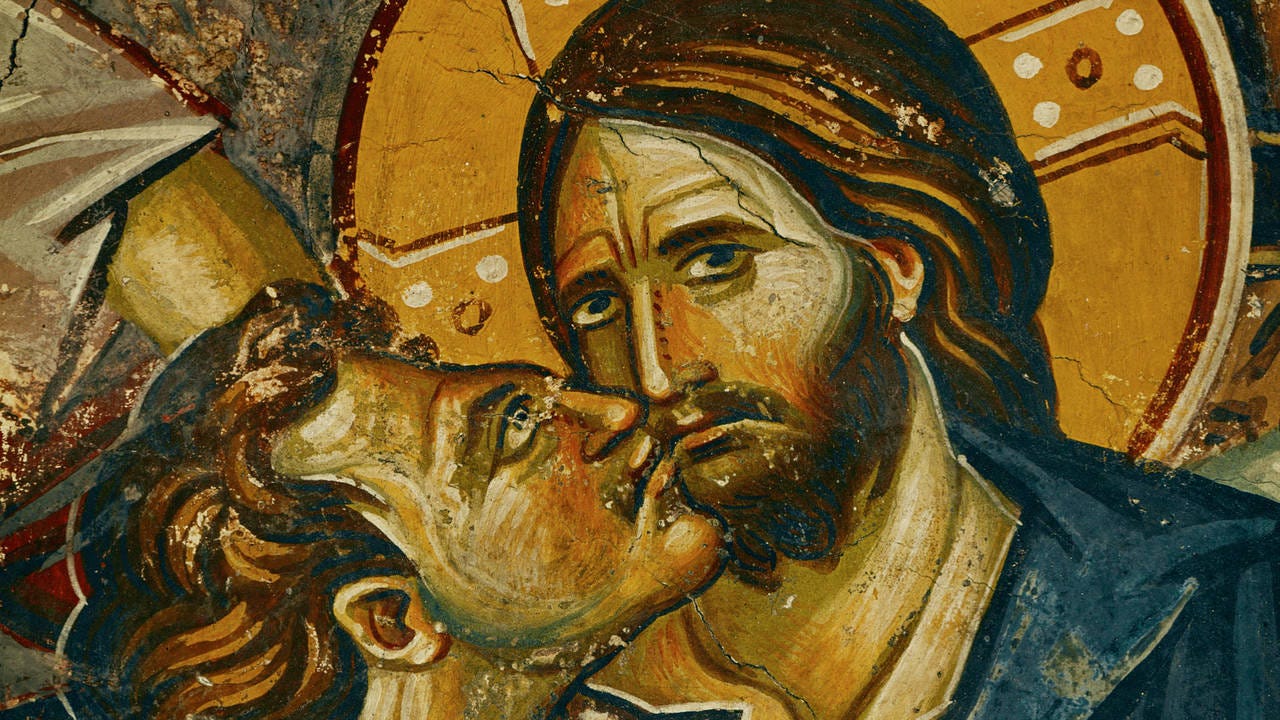


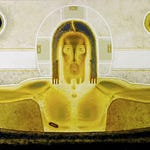
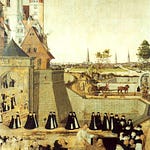
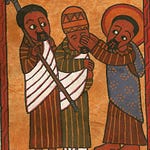




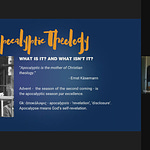


Hope for Judas Iscariot..?